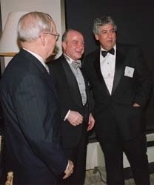The school where every MIT undergraduate must spend at least one year of study has been greatly strengthened by the announcement at its 50th anniversary party of the $75 million Kenan Sahin Fund for the MIT School of Humanities, Arts, and Social Sciences.
President Charles Vest announced that $21 million of the fund will be used to establish a set of distinguished professorships, $24 million for graduate fellowships, $20 million for new space for the Department of Economics, and $5 million each to endow the deanship of the school and to support key educational initiatives within the school.
The dean of the school, Professor of History Philip Khoury, said, "Dr. Sahin and MIT are making a statement about the value of humanistic education in the 21st century that will resonate far beyond the MIT campus."
The school's faculty (156 full-time professors) have received many awards, including three Nobel Prizes, two Pulitzers, two National Medals of Science and seven MacArthur prizes. The school's students include 221 undergraduate majors, 414 undergraduate minors and 323 graduate students, plus other MIT students who take HASS courses to satisfy the degree requirements.
President Vest's announcement -- at 10:50pm Saturday night, Oct. 7, at a gala dinner party and dance for faculty and supporters at the Museum of Fine Arts -- was the dramatic climax of a two-day celebration of the 1950 founding of the school.
"We are entering an age in which science and technology will play an ever-increasing role in an ever-growing number of dimensions of our lives," said Dr. Vest.
"MIT as an institution, and MIT as a teacher of the young men and women who will lead this age, must sustain the excellence of its School of Humanities, Arts, and Social Sciences.
"You must broaden and render more profound our intellectual discourse. You must establish the synergies that make us more truly creative. You must force our students to confront the contradictions and absurdities that unfettered technology can visit upon our society.
"You must enable us to understand more fully still the beauty and wonder of the physical universe and the living systems we come to know through our science.
"In short, you must always be an integral part of the core that makes us a great and unique institution of higher learning. May your next 50 years reflect the fullness of spirit of the gentle man who has created this opportunity," said Dr. Vest, announcing that he, former presidents Howard Johnson and Paul Gray, and Chairman Alex D'Arbeloff had decided that $75 million of Kenan Sahin's $100 million undesignated gift of last November should go to the humanities.
SCHOOL OF HUMANITIES
The remaining $25 million of the gift will be used to establish the Kenan Sahin Presidential Strategic Fund, which the president of MIT may use to undertake one or more initiatives of major importance to the future of the Institute.
Mr. Sahin, who holds both bachelor's and PhD degrees from MIT's Sloan School of Management, founded Kenan Systems, Inc., which he sold to Lucent last year. He is now group president for software products at Lucent Technologies and vice president of software technology at Bell Labs.
Commenting on the use of his gift, he said: "MIT has been a key engine of the phenomenal evolution of science and technology and their application to many aspects of society. Focusing this gift on the School of Humanities, Arts, and Social Sciences means that these fields can become even more integral to the education of students as leaders and change agents in a global society paced by technology."
A version of this article appeared in MIT Tech Talk on October 18, 2000.






